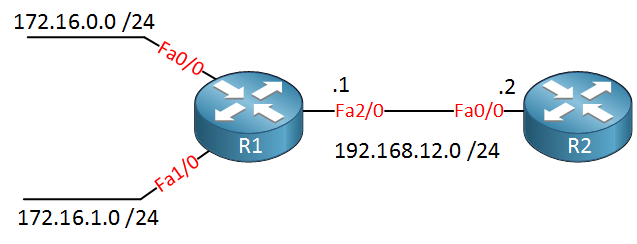How to configure EIGRP Summarization
In this lesson we’ll take a look at EIGRP summarization. The cool thing about EIGRP and summarization is that it’s easy to do and can be done on the interface level. Here’s the topology that we’ll use:

Let’s create a basic EIGRP configuration:
R1(config)#router eigrp 1
R1(config-router)#no auto-summary
R1(config-router)#network 192.168.12.0
R1(config-router)#network 172.16.0.0R2(config)#router eigrp 1
R2(config-router)#no auto-summary
R2(config-router)#network 192.168.12.0Just a basic EIGRP configuration. This is what the routing table of R2 looks like:
R2#show ip route eigrp
172.16.0.0/24 is subnetted, 2 subnets
D 172.16.0.0 [90/30720] via 192.168.12.1, 00:02:28, FastEthernet0/0
D 172.16.1.0 [90/30720] via 192.168.12.1, 00:02:28, FastEthernet0/0Two entries, as expected. Now let’s create that summary:
R1(config)#interface fastEthernet 2/0
R1(config-if)#ip summary-address eigrp 1 172.16.0.0 255.255.254.0Use the ip summary-address eigrp command to specify the summary. Now the routing table will look like this:
R2#show ip route eigrp
172.16.0.0/23 is subnetted, 1 subnets
D 172.16.0.0 [90/30720] via 192.168.12.1, 00:00:53, FastEthernet0/0The two networks disappear, and a single entry will appear on R2. The metric is 30720. How did it get this value? When you advertise a summary, the router advertising the summary will use the lowest metric of all networks that fall within the range of the summary. That’s the one it will use for the summary. It is possible to manually set the metric for each summary. Here’s how:
R1(config)#router eigrp 1
R1(config-router)#summary-metric ?The summary-metric command requires you to set the bandwidth, delay, reliability, load, and MTU. Let’s try something:
R1(config-router)#summary-metric 172.16.0.0 255.255.254.0 100000 10 255 0 1500R2 will now see the new metric:
R2#show ip route eigrp
172.16.0.0/23 is subnetted, 1 subnets
D 172.16.0.0 [90/2562816] via 192.168.12.1, 00:00:53, FastEthernet0/0Advertising a summary also changes something in the routing table of R1:
R1#show ip route eigrp
172.16.0.0/16 is variably subnetted, 3 subnets, 2 masks
D 172.16.0.0/23 is a summary, 00:01:38, Null0EIGRP will create an entry in the routing table for the summary pointing to the null0 interface. It does this to protect itself against routing loops. When you use summaries, other routers may send traffic to you for networks you don’t know where they are. When this happens, the traffic will be forwarded to the null0 interface and dropped.
Table of Content
Unit 2: EIGRP Neighbor Adjacency
Unit 4: EIGRP Advanced Features